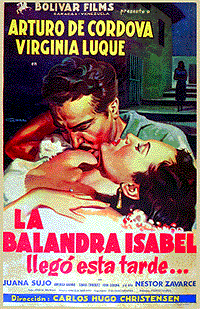The Yacht Isabel Arrived This Afternoon
| The Yacht Isabel Arrived This Afternoon | |
|---|---|
 |
|
| Directed by | Carlos Hugo Christensen |
| Produced by | Carlos Hugo Christensen Enrique Faustin Luis Guillermo Villegas Blanco |
| Written by | Carlos Hugo Christensen Guillermo Meneses Aquiles Nazoa |
| Starring | Arturo de Córdova |
| Music by | Eduardo Serrano |
| Cinematography | José María Beltrán |
| Edited by | Nello Melli |
|
Production
company |
Bolívar Film
|
|
Release date
|
|
|
Running time
|
96 minutes |
| Country |
Argentina Venezuela |
| Language | Spanish |
The Yacht Isabel Arrived This Afternoon (Spanish: La Balandra Isabel llegó esta tarde) is a 1949 Venezuelan-Argentine film directed by Carlos Hugo Christensen. It was entered into the 1951 Cannes Film Festival.
The film was part of an ultimately failed effort by the producer Luis Guillermo Villegas Blanco to establish a Venezuelan film industry during the era. For the film, Blanco brought in established film personnel and actors from Argentina and Mexico. It was shot on location and at the Bolivar Studios in Caracas.
The captain of a small vessel regularly sailing between his home island of Margarita Island in the Caribbean and the Venezuelan mainland has two separate and very different relationships. At home he is happily married, having named his boat Isabel after his wife. He also has a young son Juan who aspires to become his father's cabin boy. Yet on his visits to the port of La Guaira he has a passionate affair with Esperanza, a woman working in a seedy cabaret.
Having decided to give up his mistress, even considering selling his boat so that he can no longer visit her, she arranges to have a voodoo spell placed on him which sends him into an obsessive trance. Only through the intervention of his son, and a violent confrontation, is he finally able to break free from her control.
...
Wikipedia
